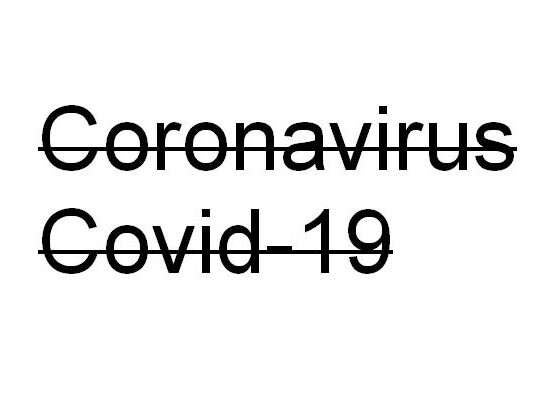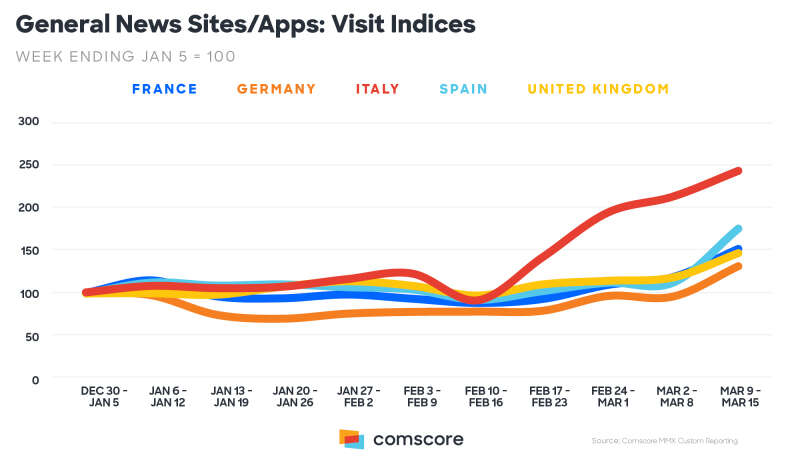
While traffic to news websites is booming as people search for the latest news on the coronavirus (Covid-19), digital advertising, which should be bringing in vital revenue for publishers, is faltering.
This is the result of “blocklisting” (an amalgam of blacklist and blocking) by advertisers, where they ban keywords to prevent their ads appearing next to content containing those words, including news stories.
The word “coronavirus” has been blocklisted by many advertisers already, cutting competition – and so prices – for ad space sold in automated auctions, known as programmatic advertising.
This at a time when people are reading little else online and news organisations are going out of their way to keep the public informed, with most journalists now putting newspapers together from their own homes.
A number of new podcasts, newsletters and campaigns relating to the coronavirus have also launched in recent weeks to cover the crisis.
Figures from Comscore (see graph below) show that the number of visits to UK news websites and apps had risen by 44 per cent in the week ending 15 March compared with the week ending 5 January.

Edelman’s Trust Barometer survey has shown that a majority of people globally (67 per cent) are getting their virus news from major news organisations, well ahead of social media (22 per cent).
Richard Reeves, managing director of trade body the Association of Online Publishers, told Press Gazette: “Consumers have voiced their unwavering trust in premium publisher sites when it comes to sourcing reliable, factual news, demonstrated by record-breaking digital monthly readership figures.
“However, while increased traffic sounds like good news for online publishers, many advertisers have been quick to add coronavirus-related phrases to their keyword blocklists in fear of brand safety issues.
“While understandable, the reality is that most news is focused around the Covid-19 pandemic, meaning there is a massive disconnect between eyeballs and advertising placements, and both publishers and advertisers are missing out on the surge of online traffic.”
Newsworks, the advertising arm of the UK news industry, said newsrooms had seen “huge spikes” in readership, with several reporting up to 50 per cent increases in page views and 70 per cent more unique visitors to coronavirus-related content.
About a third of readers at one title are spending up to three minutes in articles, according to Newsworks, while a national title has seen over 23m views of its virus-related content in March alone.
Newsworks executive chairman Tracy De Groose said: “Our industry message to advertisers is incredibly simple: back don’t block British journalism.
“An important pillar of our democracy is being compromised at a time when it is more important than ever.
“Readers are relying on us right now, and we are relying on advertisers to help fund a sustainable path for British journalism.
“We are working across the industry with the trade bodies, agencies and advertisers to help solve this issue with more urgency, because it really matters. Journalism really does matter.”
A report by The Merrick School of Business at the University of Baltimore estimated that UK publishers missed out on an estimated £170m last year due to ad blocking – about £1 in every £5 of ad revenue is lost.
Lloyd Embley, group editor-in-chief for Mirror, Express and Star publisher Reach, said: “The need for trusted, measured and informed news is greater than ever. As the coronavirus pandemic sweeps the nation, our sites have seen an unprecedented amount of traffic. People across the country wanting to know the facts – our role as journalists has never been so vital.
“However, that increase in page views hasn’t been supported by advertisers, because of blocklists. Advertisers should be working with us, backing our industry not blocking it.”
De Groose has previously warned of the unintended consequences of blocklisting, which aims to protect brands from appearing next to unsavoury content but does not distinguish from regulated, quality news output and the “wild west” of unregulated content.
For example, blocklisted words like “strip” and “shoot” have stopped ads from appearing against entirely safe sports news articles.
In a speech earlier this year, De Groose said: “In this current digital model, there is little attention to the quality of the content or the provenance of that content.
“There is no distinction between crafted journalism – that adheres to ethical standards, editorial codes, regulators and the law – and bedroom bloggers, amateur producers and at the extreme end, criminal content.”
Nick Hewat, commercial director at Guardian News and Media, said brand safety is a phrase that “only took on meaning” after The Times revealed in 2017 that ads for major brands were running against terrorist content on Youtube.
“Interestingly for an industry that claims to work on evidence, there is no evidence that advertising sitting alongside ‘hard news’ has any negative impact on the brand itself.
“However, advertisers didn’t want to take the risk that this could be an interpretation of their placement, so they used technology companies to block it.
“But even if this was a real concern, the coronavirus is different. I haven’t met anyone who is pro-virus. This is the world’s story, it is where the attention is and it is where the audience is.
“Blocking it, while the same advertisers are running campaigns on radio and social media – where all the chat is about the virus – is inconsistent, to say the least.
“And of course, not every coronavirus story is about death and despair; most are about information and comment, and there are lots of stories showing the human spirit at our best.
“Brand safety has always been a contentious issue for publishers, and it has cost us millions. We are responsible, we routinely take down ads on content about natural disasters or terrorist attacks.
“Publishers also believe that they are the only ones who are punished, in an advertising sense, for reporting and distributing the news that society desperately needs.
“The system needs an overhaul, the technology needs improving. The term ‘Manchester’ is still a blocked keyword for many advertisers on the Guardian website, despite that terrorist attack occurring in 2017.”
David Dinsmore, chief operating officer at Sun and Times publisher News UK, said the news media has become the “fourth emergency service” during the pandemic, helping to “keep millions of people across the country safe” with “rigorously-researched” and curated news and information.
Not only are newspapers providing “a vital service for our readers”, but also “safe environments for our advertising partners”, said Dinsmore.
Read all Press Gazette’s coverage of the coronavirus pandemic and the news industry here
Email pged@pressgazette.co.uk to point out mistakes, provide story tips or send in a letter for publication on our "Letters Page" blog
